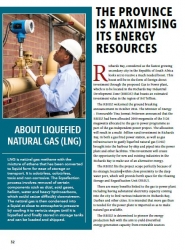The Province Is Maximising Its Energy Resources - Pivot2017-06-09 Richards Bay, considered as the fastest growing secondary city in the Republic of South Africa looks set to receive a much needed boost. This boost will be in the form of foreign direct investment through the proposed Gas to Power plant, which is to be located in the Richards Bay Industrial Development Zone (RBIDZ) that boasts an estimated investment value in the region of R47 billion.
The RBIDZ welcomed the ground breaking announcement in October 2016. The Minister of Energy â€" Honourable Tina Joemat-Petterson announced that the RBIDZ had been allocated 2000 megawatts of the 3126 megawatts allocated to the gas to power programme as part of the gas independent power project. The allocation will result in a multi -billion rand investment in Richards Bay, in both a gas fired power station, as well as gas infrastructure to gasify liquefied natural gas (LNG) brought into the harbour by ship and piped into the power plant and other facilities. This investment will create the opportunity for new and existing industries in the Richards Bay to make use of an alternative energy. The RBIDZ fits the project scope perfectly because of its strategic location within close proximity to the deep water port, which will provide berth space for the Floating Storage and Regasification Unit (FRSU). There are many benefits linked to the gas to power plant including having substantial electricity capacity coming into the city to feed various industries in Richards Bay, Durban and other cities. It is intended that more gas than is needed for the power plant is imported so as to make natural gas available. The RBIDZ is determined to pioneer the energy production hub with the aim to yield diversified energy generation capacity from renewable sources and contribute to the South Africa’s energy mix. The natural gas is primarily used in the combustion of gas for the generation of electricity and for the provision of direct energy and heating for industrial, commercial and residential/domestic processes. It is envisaged that in the long run the transport sector, which includes cars, trucks and locomotives, will also take on the use of the liquefied natural gas as a cleaner alternative to other fossil fuels since natural gas is also used as feedstock for the conversion process in the production of petro chemicals. EXPANDED AND SUSTAINED FUTURE ECONOMIC OUTPUT Significantly, the power plant will come with multiple benefits and as such will completely change the economic landscape of the country. These benefits will range from direct and indirect employment opportunities that will assist in eradicating the unemployment epidemic, an energy alternative that is more reliable and price competitive, electricity grid relief and stability and further reducing South Africa’s carbon emissions. Natural gas is considered the most environmentally friendly fossil fuel because it has low carbon emissions and the Richards Bay Industrial Development Zone embraces a new environmentally friendly energy. OPT FOR RICHARDS BAY INDUSTRIAL DEVELOPMENT AS THE PRIME DESTINATION FOR INVESTMENT ADVANTAGES FOR INVESTORS
LNG is natural gas methane with the mixture of ethane that has been converted to liquid form for ease of storage or transport. It is odourless, colourless, toxic and non-corrosive. The liquefaction process involves removal of certain components such as dust, acid gases, helium, water and heavy hydrocarbons, which could cause difficulty downstream. The natural gas is then condensed into a liquid at close to atmospheric pressure by cooling it to various stages until it is liquefied and finally stored in storage tanks and can be loaded and shipped. |
The Province Is Maximising Its Energy Resources - Pivot
Copyright © 2024 KwaZulu-Natal Top Business
